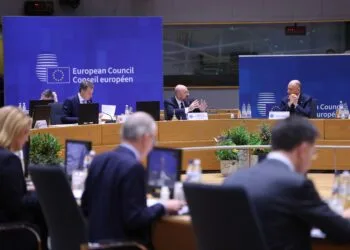Brussels – The bottom line is that the European Union is running out of money. Compounded also by all-new, unforeseen challenges that have disrupted plans and strategy, the EU is now over budget and a new budget is needed. This task will be up to the new Commission and Parliament. Still, Enrico Letta, President of the Jacques Delors Institute and rapporteur on the future of the single market, wants to set the record straight. “We have a poor budget by definition,” he says while attending the Annual Budget Conference of the European Commission. As early as now, with the current 2021-2027 multi-year budget, “we have to invent something new without changing the treaties”. In this exercise that is neither simple nor obvious, “flexibility is the keyword for the future.”
On the European Union’s political agenda, Letta recalls, “There are three main issues: transition, enlargement, and defence.” These issues “are not marginal,” neither in ambition nor in funding, “and it is clear that we cannot manage these three main elements within the current framework” of the budget. Rules and resources are not suitable, and from Brussels comes the call to do better and do more: “We need to change the budget framework and mentality.” But above all, Letta emphasizes, “We need to increase our budget.” Because, he explains, “the economy alone cannot save us, and we also need politics.” And the choice to put more resources is, precisely, a political one that the EU must know how to make.
The next European legislature is called for the change of pace that Letta calls for, reasoning on how to future-proof the European Union with all possible options. “We can reach a political agreement only if we put all possible tools on the table,” the former prime minister warned. He evokes a mix of public and private resources and innovative solutions. A far-reaching set of actions that cannot be avoided, “otherwise everything becomes more complicated.” Because today’s EU is not equipped for the challenges of the moment. “Defence is completely outside our budgetary possibilities,” he stresses, to offer an example which is not incidental.
It is the new priority, dictated by the war in Ukraine and the Middle East crisis, of which Brussels is aware. “We have to combine our soft power with hard power,” stresses Johannes Hahn, Budget Commissioner. “We have to manage two wars near to us, a migration crisis, a double transition, and if we want to remain world leaders, we cannot leave European security largely in the hands of the United States.”
English version by the Translation Service of Withub![Enrico Letta all'Annual Eu Budget Conference [Bruxelles, 29 aprile 2024]](https://www.eunews.it/wp-content/uploads/2024/04/letta-240429-750x375.jpeg.webp)






